| 2
January 2002 (Link
to this entry) (Comment)
I spent a long amount of time considering what
I would write in response to the New Year. Should I write a summary
of last year, the victories and sorrows? Should I write my wishes
for the New Year? No matter how I approached the topic, I felt no
motivation to write about the changing of the year. Rather than continue
to struggle with what to say, I turned my attention to considering why
I felt there was nothing to say.
More than ever before, the New Year celebration
this year felt anti-climatic. Designed to celebrate the passing of
the old year and the dawning of the new, I realized that this artificial
construct fails to capture the reality of life. While the calendar
shows a finite period of time has passed, our lives are a continuum, a
connected line. Yesterday is linked with today, today with tomorrow,
without break or separation. We draw a line between December 31st
and January 1st, wrap the previous year in brown paper and set it on the
shelf, believing we now have a fresh moment, unconnected to the past, in
which to recreate ourselves.
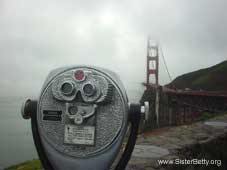
The practice of mentally drawing lines, separating
and severing connections between the interconnected is something humans
have done for centuries. Us and them, here and there, rich and poor,
science and spirit. Connections make things messy, require thought
and consideration, whereas disconnection allows us to pretend that our
actions can exist without consequence, impact or responsibility.
Disconnection allows us the illusion that we can easily package the universe
into understandable containers effortlessly placed under our control.
Reality is not disconnected. Lines connect
people to the land, to each other, to the universe beyond. Our relationships
are tangled shapes that defy logic or definition. Our decisions and
actions are often based on a long lineage of history, place and culture,
and those decisions often have impact far beyond what we can see and feel.
The changing of the year is the flow of wind across
the land. The air may sweep by this point or that, but it remains
a constant flow, uninterrupted, connected to what came before and what
will come after.
I took a friend from Dallas to see the Golden
Gate Bridge. We stood at the eastern approach and watched the fog
roll over the ironwork. Thousands of people had stood in that spot
before; thousands will stand there after. We were just two, in a
constant stream, part of a larger whole that we often forget about as we
move through our lives. Our presence is both a miracle and unremarkable
in the same moment.
4 January 2002 (Link
to this entry) (Comment)
There are moments in life I wish I could capture,
keep in a box next to my chair so I can take them out from time to time,
show them to others and enjoy them again. Photographs and momentos
are human attempts to achieve this goal. Moments, however, contain
life, energy and emotion that translate poorly to flat paper or bits of
memorabilia.
I don’t know exactly when we started the tradition,
but in the early days of bingo we began spanking players whose cell phones went off during the games.
The practice became so popular that we began spanking people for other
reasons and shortly thereafter someone donated a large, jeweled paddle.
Some people attend primarily to see the public paddling.
Last night, Sister Mary Mae and I were working
the microphones and had doled out several good spankings. Suddenly,
and without warning, Sister Mary Mae began an impromptu auction to spank
me. It was terribly funny, and the crowd went crazy for the chance.
The winning bidder paid $100 for the opportunity, and swung the paddle
with such force its metal spine bent.
This might seem strange if you’ve never attended
bingo, but for those minutes the entire crowd was completely focused, completely
gathered and the room filled with a laughter and joy as pure as such moments
come. The money went to charity and everyone went home with a story.
But there was a piece of the moment that no one
in the room caught but me. I must admit that in the past I never
really liked Sister Mary Mae all that much, although we’ve made our peace
in recent years as we’ve both grown and matured. Last night, in those
moments we were on stage together, I saw a different person in Sister Mary
Mae, a person filled with creativity and compassion. It was a different
kind of light – one that doesn’t register in the light meter of the conventional
camera.
Someone recently asked me if we were videotaping bingo,
to capture all the wackiness, the performances and the moments that would
otherwise be lost. I said no, we aren’t. In fact, I don’t allow
video cameras in the bingo hall. It’s yet another odd thing about
being human – in trying to capture the moment, we often miss it altogether.
4 January
2002 - Several minutes later (Link
to this entry) (Comment)
By the way, two websites that are worth peeking
at:
DaltonLand - My friend in Dallas who is both performance and artist created this little
destination.
The Coalition
for Continuing Moronic Traditions is a nice tongue-n-cheek site.
5 January 2002 (Link
to this entry) (Comment)
It’s cold and grey in San Francisco. I seem
to be unable to recover from the cold I’ve had since Christmas.
I went out for a few hours today and had lunch with a friend. Returning
home, I curled up on the couch and fell asleep. I’ve moved to the
bedroom where the portable heater makes the room very comfortable, and
I think it’s likely I won’t move much further today.

I’ve many topics floating around in my head:
my ongoing work on forgiveness, Becky’s comments about church, Mark's
ideas about rebuilding and thoughts about peace and reconciliation.
There is a good amount of serious thought and writing in the queue for
this year. But not much of it will be done tonight.
“We must remember that there is one worse thing
than failure to practice what we profess, and this is to water down our
profession to match our practice.” – Friends World Conference, 1952.
6 January 2002 (Link
to this entry) (Comment)
As a society, we use our language very carelessly.
Our collective conversations are filled with meaningless phrases that fail
to convey the truth of our situation, erasing the need for thoughtful consideration
before speaking. Popular catch phrases allow us to speak without
dialogue and offer no challenge to the prevailing communal ideas.
Americans have always been fond of “justice”,
more so in recent months. We speak of obtaining, creating or fostering
justice. Unfortunately, as a society the word we really mean to use
is “vengeance”.
Vengeance is the act of inflicting punishment
for a wrong perceived or committed. It is the act of making the abuser
feel the suffering of the victim, the desire to hurt others in the manner
in which we were hurt. Most often, it is a demand that the person
responsible for our pain pay a price exceeding ours – interest on the damage
they have created by their actions, word or deeds.
The difficulty with vengeance is three fold:
First, the perception of damage is entirely subjective.
The abuser, abused and those entirely outside the situation will all perceive
the damage differently. What is the proper price for the pain inflicted?
The answer to the question rarely can be answered with unity.
Second, no punishment, regardless of structure,
can ever repair damage done. History is a locked cabinet with glass
doors – we can look through them, but we cannot touch what is inside.
Once past, we lack the ability to change what time holds. To attempt
to do so is a futile adventure.
Third, vengeance allows our sorrow to be burned
away into anger. It allows us to move forward in a campaign of righteousness
that obscures our need to grieve and to reflect on our own responsibilities
for damage within our communities.
Whereas vengeance denotes pain, justice denotes
healing. Unlike vengeance, which is based in emotion, justice has
roots in wisdom. Justice recognizes that punishment cannot repair
past damage, that punishment that exceeds reason itself becomes abuse.
Justice is the recognition that much of the pain and suffering the world
comes from sources much deeper than the symptoms we complain of most.
Justice makes demands of all involved. It
requires that we acknowledge our human inability to change the past and
experience our own grief. It requires that we look upon those who
do wrong as human as well, and that appropriate punishment be both humane
and in the end, a means of restoration.
In its purest form, justice is the practice of
recognizing wrong and attempting to put the pieces back together in whatever
form remains possible. Where the pieces no longer fit, it is about
accepting we lack the power to fix our world and creating new solutions
to bridge the gaps.
Vengeance is an easy conversation that requires
no thought. Justice is a more difficult dialogue that requires we
be present in a way that most of us would rather not be.
To borrow a clichéd term from our market
economy: Do we invest for the short term or the long term?
If the latter is the case, then what is the long term solution we desire?
Shall we continue investing in unending vengeance or move to a portfolio
of justice?
9 January 2002 (Link
to this entry) (Comment)
In my life there are only two people I have ever
dated who I cannot sit and have a pleasant conversation with. The
first is Ricky Joe who stole everything I owned while I was out at sea
years ago. I came home to an empty house and empty parking spaces.
He took it all. It was a long time ago in a place far away, and my
anger has disappeared into mild amusement. Besides, I never should
have used torchiere lamps to decorate in the first place.
The second person was a much more recent affair
and lives much closer, one and half blocks away, to be precise.
I stopped writing and paused for a moment, because
summing up a relationship in a paragraph is difficult and requires I leave
out most of the details. Here are the basics: he was beautiful,
I loved him, he was fun to play with, he wanted a marriage and was willing
to do whatever it took to get it. I was dating someone else at the
same time, although they both knew about each other. In the end,
we were both going through the motions of something that wasn’t working
and I said so, as best I could. In retrospect, maybe what I said
was not as good as it could have been. I’ve never quite learned how
to phrase “I love you but I’m leaving you.” It sounds terrible no
matter how you say it.
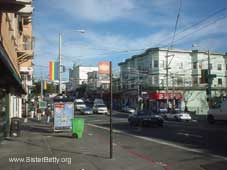
He blocked my calls immediately and for six months
didn’t speak to me. Then late one night in February he called.
He said he loved me and wanted to see me again. I agreed. He
never showed up. He never called again. I didn’t see him in
the neighborhood or on the street. He vanished.
Then on Monday of this week, I saw him at the
gym. He saw me too, but pretended not to. Finally, I walked
over to him and said hello. I put all the positive energy I could
muster into that hello. Never say hello to an iceberg, you just hear
your own voice, shiver and wonder what is the appropriate amount of time
to wait before walking away.
I used to wonder what became of him. Now
I see him nearly every morning and I still don’t know. What I want
to do is wrap my arms around him and cry for awhile.
10 January
2002 (Link
to this entry) (Comment)
Organized religion in general and Christianity
in particular have a less than admirable track record when it comes to
queer folk (and a lot of other folk, too). Growing up in a Southern
Baptist household and wanting to spend my time in the arms of other boys
presented certain irreconcilable challenges. Men won out over God,
in part because having a conversation with someone you can actually hear
has its advantages.
I never read the bible as a child, except when
I was forced to after dinner or when I had to memorize verses at summer
camp. We always read the same passages, rarely straying into the
rest of the bible. We trusted the preacher would tell us whatever
else we needed to know. Based on what he said, I was pretty sure
there was nothing else I was interested in, anyway.
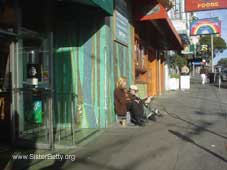
I always thought there was just one bible, one
single version. Different translations may exist of that single version,
but just one bible. Partly out of curiosity, partly out of wanting
to explore what the truth was in this book, I bought a bible several months
ago. It’s the first time I ever knew there was more than one version
of the bible – there are at least three: the one I grew up with,
the Catholic and the Orthodox. And all three are slightly different.
I’ve started reading the bible, not with any pattern
or method, but just opening up to this book or that and reading for awhile.
And an interesting thing is clear to me: most people have missed
the point of this book, or at least what I’ve read. For example,
I read last night a piece where Jesus says (a) don’t pray in public, do
it in the privacy of your room with the door closed and (b) don’t use a
bunch of words to praise God, it isn’t necessary and (c) don’t ask God
for anything you need, because God is already quite aware of what you need
before you even pray. He went on to say that teachers and followers
are equal in the world of Christianity.
This of course, has no parallel to my childhood,
where pastors and preachers somehow had a greater and unquestionable power
and connection to God that the rest of us lacked. Prayer was (and
is) filled with great praise and queries for help, and is often done with
great fanfare and publicity (think televangelist).
In the same book is the line “judge not, unless
you be judged yourself”, which has double meanings. My pointing all
this out is not to judge those who engage in these activities, but rather
to say I find it curious that all I was taught about this book is falling
to pieces as I actually read it.
Last week in the Quaker meeting, someone said,
“If you read the bible, it’s quite clear that Jesus was a communist.”
I haven’t got to that part quite yet, but I’m pretty certain he wasn’t
the guy I was told he was.
12 January
2002 (Link
to this entry) (Comment)
I can’t remember the last time I a saw a film
so good that I never wanted to see it again. Last night I saw a film
so well done that I wish I had never seen it at all. I can feel the
images of it in my body.
The film is Das
Experiment, part of the Berlin & Beyond Film Festival in San Francisco.
The festival celebrates German films that rarely make it to this side of
the Atlantic. I suspect that mainstream America isn’t big on subtitles
unless they are part of cheaply produced martial arts or atomic-monster
films.

Das Experiment is unlikely to be a big hit in
the states for another reason: it portrays in accurate detail how
prisons become incubators for violence. The film draws on the real
experiment conducted by Stanford University where students were used in
a prison simulation. Within days, the situation became so violent
that the experiment was prematurely terminated. The film takes this
story, weaves it with characters of remarkable depth portrayed by actors
with talent, paces the story perfectly, and ends with images that had the
entire audience audibly begging for it to end. As soon as the credits
began to roll, I wanted out of the theatre.
Most frightening films draw on situations that
are unlikely to happen at all, or unlikely to happen to you. Chances
are demons won’t fly out of your basement, your mother won’t give birth
a chainsaw carrying brother, you won’t be framed for murder by a former
lover. Das Experiment is entirely different, it points to the violence
that rests just below the surface of every day life and ease by which it
can be unleashed.
14 January
2002 (Link
to this entry) (Comment)
There are days when I think I need to hang a sign
on my door that says: Reminder, Human Beings Inside.
Six years ago, I started a website for the SOMA Bare Chest Calendar, a local activity that brings in much needed money
for the AIDS
Emergency Fund. I’ve hosted and maintained the site at no cost
since then, increasing the visibility of this project. Last year,
I added online sales and shipped the calendars around the world.
It’s been fun and I’ve enjoyed doing it. Until today that is, when
I got a note saying that my services were no longer needed.
However carefully phrased, the message was the
same: the calendar has a new commercial sponsor and they’d like a
little more visibility, please. Therefore we’re axing you and moving
to a professional marketer for the website.

Perhaps moving the website makes sense, I can’t
really say. What bothers me is to learn the discussion to make the
change has been ongoing and that despite six years of volunteer efforts,
I wasn’t invited to be part of the dialogue or even warned this decision
was being considered. It upsets me, and more than just a little bit.
I’m not angry, I’m sad. I put a lot of effort into this project,
it feels hostile to have it pulled away so suddenly.
Last year, I was with my nephews and my brother
– their father – waiting for a movie to begin. Nephew #1 hit Nephew
#2, and Nephew #2 began to cry. My brother grabbed Nephew #2 and
said “Stop crying, the world is a tough place, get used to it.”
I call bullshit.
As human beings, we have both the remarkable ability
to love and wound each other. It’s an amazing thing to be loved;
it’s a terrible thing to witness the wounds we can inflict on each other.
Compassion doesn’t take much effort, really.
It just requires we step out of ourselves for a moment and consider the
impact of our actions on others. It can be as simple as yielding
our seat on the bus to someone who looks tired or a phone call to a friend
who we haven’t seen in a week or two.
If my brother is correct and the world is a tough
place, it’s because we choose to make it so. We could choose a different
path, it would just take a little more work.
Maybe we should hang a sign on the planet:
Reminder, Human Beings Onboard.
15 January
2002 (Link
to this entry) (Comment)
I spent today teaching for a client. I love
teaching. More than coaching or consulting, it lets me really play
in a big group, like recess during school. Sometimes I find myself
tired after a day of teaching, but it’s a satisfied weariness, a desire
to relax after having accomplished the task at hand.
More and more I find my students reaching for
greater depth. There is a hunger for human connection and understanding
that seems to grow with time. I like to think this means we're heading
toward a more caring world. If you have evidence this is not the
case, please keep it yourself.
After class today, one student asked me if we
had support groups for students who value more learning and find group
support useful in creating change in their lives. We don’t, but I
certainly like the idea.
I picked up some pasta with a tasty-sounding name
at the market on the way home, I’m off to share some with a friend and
then get some sleep.
16 January
2002 (Link
to this entry) (Comment)
I had a strong sheet of ice on my windshield this
morning. It’s the first time in my six years in San Francisco I’ve
had ice on my car. I grew up with a scraper under the driver’s seat.
I haven’t owned one of those in years. So I sat and waited for the
defroster to get warm enough to melt it away.
I’m amazed at all the discussion around Enron
and its finances. I spent five years working in the executive staff
of two publicly traded companies – one on the New York Stock Exchange and
one on Nasdaq. Public companies have one priority: quarterly
profits. If the profits don’t exist, you have to create them, and
there are lots and lots of ways to do it. The stock analysts work
for the brokerage firms that profit from the stocks, and the auditing firms
often have cozy relationships with the corporate executives. Some
day very soon, when I’m not heading out to meet a friend for dinner, I’ll
share some of the gory details.
Most corporations are houses of cards and lots
of them have failed exactly as Enron did. Enron was just a much bigger
house of cards and made more noise when it came down.
I’m not the first person to say it, but I believe
this to be true: if President Bush weren’t so busy fighting terrorism,
special prosecutors would be lined up from Pennsylvania Avenue to Dupont
Circle.
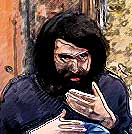 On
an unrelated subject: why is that months after we capture John Walker,
the only photograph of him in the newspapers is still the image of him
filthy, long-haired and gaunt as he first emerged from the dungeon?
I imagine that image fits more closely with the ongoing portrayal of him
as a “fanatic” than do images of him cleaned up and healthier. If
I ever get arrested, I hope it’s on a morning I remember to shave. On
an unrelated subject: why is that months after we capture John Walker,
the only photograph of him in the newspapers is still the image of him
filthy, long-haired and gaunt as he first emerged from the dungeon?
I imagine that image fits more closely with the ongoing portrayal of him
as a “fanatic” than do images of him cleaned up and healthier. If
I ever get arrested, I hope it’s on a morning I remember to shave.
17 January
2002 (Link
to this entry) (Comment)
When I lived in San Diego, my neighborhood formed
the boundary between the upscale and questionable districts of the city.
Police helicopters thumped overhead every night, all night. The whump-whump
of their spinning blades served notice that crime was everywhere and so
were the eyes of the police. Often high intensity spotlights from
above would burst through the windows as the helicopters searched for someone
who had stolen yet another car or forgotten to use a turn signal.
Before September 11th, I rarely heard helicopters
in San Francisco. Aside from the annual screaming of the Blue Angels
during Fleet Week, the occasional whir of a blimp during baseball games,
and very rare appearances of news helicopters during infrequent building
fires, the sky remained clear; the night carried only the sounds of the
city itself.

I’m not certain if the San Francisco police had
a helicopter they rarely used or if they recently acquired the noisiest
one they could find. In either case, they now circle the city every
night, sometimes for hours. The relative quiet of the streets is
now filled with the sound of eyes staring down from above. Geographically,
San Francisco is a small place, so it doesn’t take long for them to reach
one side and head back again for the other. I’m not sure what they
are looking for, but I hope they find it soon and go back to earthbound
patrols.
I don’t like having the police circling overhead
for several reasons. First, it’s noisy and some people like to sleep.
Second, helicopters do and have crashed. San Diego used to crash
them all the time. With tens of thousands of people per square mile,
that helicopter is going to take out a good number of citizens. And
lastly, and more importantly, I just don’t believe having a helicopter
circling the city deters crime or terrorists and is a huge waste of money.
If the police need expensive toys, let’s give them DVD players for Christmas.
18 January
2002 (Link
to this entry) (Comment)
My office is in Pacifica, a tiny town a few miles
south of San Francisco on the coast. People in the Bay Area have
the mistaken notion that Pacifica is eternally shrouded in fog which keeps
the number of visitors to a minimum. Pacifica was traditionally a
working class city and many of the houses are simple affairs with fantastic
views of the surf.
Many of the residents are second or third generation
Pacificans.

The drive to Pacifica takes you over a high hill.
Cresting the hill the road suddenly makes several sharp turns, each revealing
a new and more impressive view of the coastline before. In the winter
the waves often grow to impressive heights, sometimes washing over the
fishing pier. The smell of ocean fills the air and bits of fog still
linger in the canyons. Each day the scene is just slightly different
and after three years the pleasure of seeing it daily remains. Maybe
it’s a cliché, but true wealth rarely resides in bank accounts.
I went to the doctor this morning and learned
the tiny bump on my eyelid needs to be removed. The procedure will
leave me with a severe black eye that will last three weeks. Given
the recovery time, it’s impossible to schedule the procedure when I won’t
be seeing clients shortly afterwards. I could claim to be a victim
of domestic abuse, but that would require having someone in my life, and
I haven’t had a real date in months. Maybe I’ll tell people the cats
are upset about the diet food I feed them or the police visited after reading
my comments about their helicopter. Perhaps I’ll just wear really
big Jackie-O sunglasses to my appointments. Suggestions?
18 January 2002 (Comment)
Here is the new
archive of photographs from this column. You can also see larger
versions of any photograph in the column by clicking on it.
I also reworked the contact
page - the troublesome contact form is gone and replaced by a CGI script.
Did I mention I have a live
internet camera in my office? Generally, you can take a peek
Monday through Friday from 9 until 4 (Pacific) here.
19 January
2002 (Link
to this entry) (Comment)
I fell in love with San Francisco on New Year’s
Eve 1994. At midnight, hordes of queers stormed Castro Street and
stood yelling, throwing toilet paper over the Muni wires and rejoicing
in the arrival of another year. Traffic ground to a halt as the impromptu
carnival filled the street from end to end. For a boy from a small
town who spent most of his adult years in the Navy, it was unlike anything
I had experienced before. I knew I had to live in this city.
Having lived here for nearly six years, I sometimes
tire of the city. Then I take a drive to the other side of the bay
or a weekend trip to another city. After a little time away, the
sight of the skyline and the fog makes me smile. It’s the return
of a long-term lover who, returning after brief separation, makes us remember
the reasons we originally fell in love.

I slept in this morning having enjoyed very pleasant
company the evening before. After a brief trip to the gym, I ran
into an old friend and we stood on the corner in the morning sun and talked.
He listens well and I tried to return the favor. He is a respected
author who I enjoy talking to a great deal. Another friend soon happened
by and the three of us continued the conversation. Then a fourth
acquaintance walked across the street and shared his morning stories with
us. It was a perfect San Francisco moment.
I found myself sitting on the steps of a barbershop
in the afternoon with an old lover. He’s studying to become a nurse
and had a lot to say. We watched the river of pedestrians passing
along the sidewalk, some who stopped to say hello or nod in acquaintance.
The weather has been cold lately and it was the first day in many weeks
San Franciscans could sit outside in the sun. When the sun began
to drop behind the buildings, I walked my former lover to the corner and
he headed one way and I the other.
I think it’s easy to forget the valued and yet
invisible connections we have to others around us. Some nights I
feel very alone, failing to remember days like today where I spend long
hours in the company of friends and acquaintances. Although we all
lead different lives, in this little city we eventually all run into each
other again and again.
Before I lived in San Francisco, I never really
understood the concept of “home”. Sitting on the steps of the barbershop,
I know I comprehend it fully. Sometimes I think of leaving this place;
then I enjoy a day like today and know I won’t be leaving anytime soon.
20 January
2002 (Link
to this entry) (Comment)
I discovered today that this site is tangentially
linked to a site touting a video that: “...presents a story that few have heard, allowing former homosexuals
the opportunity to tell their own story in their own words. Along with
medical and mental health experts, these individuals express a clear warning
that the sanitized version of homosexuality being presented to students
is not the whole truth.”
Well kids, it’s true. Will and Grace doesn’t
tell the whole story of being queer. If a homosexual recruiter calls
you, remember these important points:
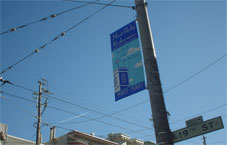
- Queer homelands are located in expensive cities like
New York, San Francisco and Los Angeles, so be prepared to pay extra if
you choose to be queer. You get to pay extra taxes, too.
- You’ll never be able to leave the house without matching
your shoes, belt and handbag.
- You won’t be allowed to wear plaid shorts to popular
vacation destinations.
- You’ll have to learn the difference between parties
when you should wear flats and when you should wear heels. Often,
you’ll be confused when the women are wearing flats and the men are wearing
heels.
- If you get overweight and are a man, you’ll be called
a Bear. If you get overweight and are a woman, you’ll be required
to buy a motorcycle and ride at the front of an annual parade.
- Your new queer friends will sing songs from musicals,
even if you don’t like musicals. You’ll be expected to know which
musical each song is from and which diva sang it first. It will be
difficult to find other queers who like heavy metal music.
- If you choose to be queer and then go back to being
straight, the Ex-gay movement will force you to appear in videos, thereby
embarrassing you and your family for as long as video tape remains a viable
communication technology.
- You’ll have ample opportunity to consider all the
social institutions that oppress others and may actually be called to make
changes (or you can take drugs to alleviate the feelings of sadness caused
by this situation).
- No matter how much or how long you love someone,
you’ll not be allowed to marry, have direct inheritance rights, or raise
children. If your lover lives in another country, they’ll likely
never be able to immigrate.
- You’ll have many chances to be one of 1,400 people
attacked annually for your sexual orientation, including the incredible
opportunity to be killed or severely wounded.
Remember, kids, heterosexuality is the key to true
happiness and success. That’s the reason for this website and this one, too.
22 January
2002 (Link
to this entry) (Comment)
Since discovering my somewhat strange connection
with an ex-gay
video, I’ve been thinking about the gay/ex-gay battle and the way each
group treats the other. Ex-gays often use the word “compassion” to
describe their actions towards gays, but the tone of their dialogue is
one of strong condemnation and judgment. Gays, on the other hand,
hold ex-gays with absolute contempt. This is not to say some of these
feelings aren’t warranted, people on both sides of the equation have said
and done some pretty nasty things.
There are at least two major problems with the
gay/straight debate that are either not considered or not discussed:
First there is the question of “attraction” versus
“orientation”. A friend of mine clarifies this issue like this:
“I can be attracted to having sex with lots of different people, but it’s
the person I dream of curling up with, of holding at night, that determines
my orientation.” As human beings, we’re capable of having sex with
either gender. The plumbing fits in all sorts of configurations,
and both genders have great arrangements for a wide range of pleasurable
activities. So, even though I might normally like to play with men,
my body is completely capable of enjoying playing with women, too.
Spend a few months on a ship at sea and you’ll quickly see how men who
normally prefer sex with women find sex with men somewhat satisfying.
What determines by “orientation” is not where I leave my fluids, but rather,
where I leave my affection – the gender of the person I want to hold close
at night. While sailors might like to have a romp with a fellow sailor,
they’re highly unlikely to spend the night in each other’s arms.
The second problem is that the debate over sexual
orientation is always reduced to two polar opposites. Either I’m
gay or I’m straight. While this may play well in the press and make
arguments simpler, it fails to address reality. In between gay and
straight is a spectrum of orientation, and some people who reside in the
middle may be able to move in either direction with greater comfort than
those who reside on the end.
In the discussion of gay versus ex-gay, the assumption
is made that people who are “ex-gays” went from the far end of the spectrum
(gay) to the other end of the spectrum (straight). This radical conversion
is trumpeted as proof that a homosexual orientation is indeed something
that can be changed. But, given we can (and do) function sexually
with either gender, cultural coercion can be a powerful factor in getting
someone to attempt to live a lifestyle that is counter to their orientation.
Further, given the person may sit somewhere other than the far end of the
spectrum, such a move may be more or less in keeping with the person’s
orientation in the first place.
Sexual orientation comes with a lot of cultural
baggage, especially for men. This cultural baggage often manifests
in psychological baggage that can be a challenge for anyone to face, especially
when those around them are not supportive.
John Paulk is a “former homosexual” who headed
up an ex-gay group in Washington, DC, and wrote a book about converting
homosexuals. A couple of years ago, he was photographed in a DC gay
bar talking with other gay men. For months, the gay press held the
story and John Paulk was forced to resign from his position as head of
the ex-gay group. After his fall from grace, I suspect it was hard
for him to find solace in the gay community, certainly his actions as an
ex-gay leader would not garner him a great deal of support. But having
fallen, can we as a group find it within ourselves to offer forgiveness
and acceptance once again? Can we open our arms to those who struggle
to find themselves, uncertain of where to turn?
If John Paulk turned up at my front door intercom,
would I press the button and buzz him in? Or would I leave the door
closed and send him down the street? What would you do?
23 January
2002 (Link
to this entry) (Comment)
To teach my kittens not to scratch the furniture,
I placed a scratching post near the front door of the apartment.
Every time I came home, I’d kneel down and scratch the post with my fingers.
The kittens would hear the scratching, run to the door and scratch the
post with me. After a few months, the kittens would hear my key in
the lock and already be furiously scratching at the post by the time I
opened the door. It became our default greeting and kept my furniture
scratch free.
I moved last month and the new apartment has a
narrow entrance hallway. Thinking the scratching post looked out
of place, I put it behind a recliner in the living room. After eighteen
months of scratching, I figured the cats knew where to go. When the
cats stopped coming to greet me at the door, I figured the new apartment
was colder than the old one, so they must be staying in the warmer parts
of the house. They’d look down at me from their tall cat tree with
indifference. Maybe they had just outgrown the excitement of meeting
me at the door.
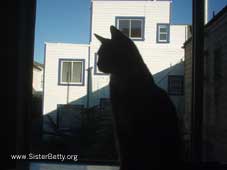
Then, one of them decided the couch looked like
a good scratching post. Just a little bit, anyway. I decided
it was time to put the scratching post back by the front door. Like
magic, the greetings returned. By the time I open the door, they
are scratching furiously and waiting for me to kneel down and scratch too.
I forget how comforting certain rituals can be.
It’s the reason people flock to church when things aren’t going so well.
I suppose as long as that scratching post is there, somehow the cats know
I’ll be back from wherever I went, and I’ll know they’ll be there to greet
me when I return.
24 January
2002 (Link
to this entry) (Comment)
I spent most of the last two days interviewing
people for two short-term contract positions with my consulting firm.
I don’t particularly like interviewing people. I dislike having to
compare people and then choose which person is better than another.
After eliminating clearly unqualified candidates, narrowing the field to
a few finalists, the decision often becomes a murky one. Most of
all, I dislike calling finalists and telling them we chose someone else.
When a friend of mine was told he was the runner up for a position with
a different company, his father said: “Well, I guess you are the
first loser.” I’d rather watch parasites devour carrion than have to make
those calls.
People do silly things when they apply for jobs.
When I place ads, I generally include some directions such as “please no
email attachments”, “please include your salary requirements” or “no telephone
calls, please.” I’m uncertain if people don’t read the ads or just
ignore the directions, but a good portion of the responses I receive do
exactly the opposite of what I asked for. Maybe those directions
are too complex, I can’t be entirely certain. I’ve learned to use
this as a quick way to eliminate candidates – I file them under “Can’t
Follow Directions.”
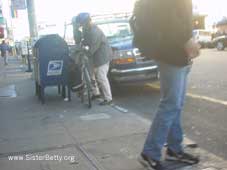
Listening is an important skill in my world.
I generally throw out submissions that start with “I’m the perfect person
for you!” I’m baffled how anyone could make this statement before
we even talk. I might be an ax murderer with a history of secretaries
that go missing – still think you’re perfect for the position?
Listening is utterly essential during an interview.
I know it’s human to be anxious, and in tight economic conditions even
more so. I remain completely flummoxed by how poorly most candidates
listen to questions I ask. At least three quarters of candidates
ignore questions completely and jump into selling themselves. My
number one recommendation to anyone searching for a job: Good listening
skills sell you better than any sales speech you practiced in advance.
Being able to hear my needs and respond artfully is the best sales technique.
This is tough, more so when you are apprehensive.
In a perfect world, interviews would work both
ways – the employer evaluating the candidate and the candidate evaluating
the employer. In reality, it’s often very one sided; the employer
holds the political power and the candidate is hungry for a job.
This is the core of why I dislike interviewing so much. From time
to time I run into confident people who let you know they have power in
the process too. It’s those people I like to hire.
25 January
2002 (Link
to this entry) (Comment)
Tomorrow night, there is a march in the Castro
to commemorate the one-year anniversary of Diane
Whipple’s death. The organizers of the march are quoted as saying
the purpose is to remember Diane’s “spirit”.
I’ve participated in many protest marches in my
life despite the fact I believe they are a poor way to express solidarity
or create change. Perhaps in Eastern Europe or South America where
tens of thousands of people show up they have some merit, but in the United
States I think we use them as a way to avoid having to do any of the really
tough social change work. If I march in the street, I can go home
afterwards and watch the television news coverage, thinking I’ve done my
part to change the world.

I’m somewhat baffled at the need for this march.
This was not a hate crime, the victim was not selected because she was
a woman or a lesbian. By all objective measures the government is
pursuing the case with vigor and intent – which, given that other dog maulings
in poorer, more ethnic neighborhoods have gone unprosecuted, may be an
endorsement of the fact the victim was white and upper class. To
have someone you loved mauled to death by a vicious dog is indeed a tragic
event, but I just don’t quite get the reason to march in the street over
it a year later. We’ve had numerous queer killings and deaths in
the past year, most of which are all but forgotten. Why does this
one stand out?
I suspect that if Dianne Whipple was not white,
upper class, and most importantly, attractive, there would be no march.
But, she was all of those things, which makes her purity assured and her
sainthood guaranteed. We can all agree her loss was a tragedy, whereas
had she been darker skinned, lived in a poorer building, perhaps took drugs,
we’d be less likely to embrace her canonization with such fervor.
The death of Dianne Whipple was a tragic event,
and the loss to those who loved her was real. At the same time, if
we are going to march in the streets, let’s do it for something that really
needs attention, such as the schools without plumbing and heat, the twenty-five
percent of our children that live in poverty and often go without adequate
food, the homeless on our streets, the suffering of our elderly.
These issues aren’t as pretty as the blond tennis coach, but they deserve
at least as much of our attention.
26 January
2002 (Link
to this entry) (Comment)
At lunch with a friend yesterday, I shared my
thoughts about the Diane
Whipple march. We started talking about the other big protest
marches that have been organized in this neighborhood: Princess Diana
(no, I don’t understand that one either), Matthew Sheppard, and the annual
Harvey Milk March. All white people, most of whom were young and
attractive.
I’m not the kind of person to cry “racism” at
every turn, and often I find such accusations without merit. At the
same time, I think it is useful to examine our lives and find those places
where we are inconsistent, where our actions fail to follow our words.
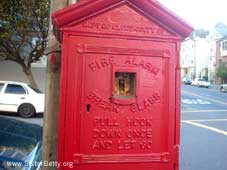
I know of at least three black gay men who have
been killed in the past two years, one by his white stepfather in Seattle,
another repeatedly run
over by a car in the south. Perhaps there are others. Not
one of these garnered either the attention or the marches that Matthew
Sheppard did, despite the fact they were arguably as horrific, as serious
and as hateful as his killing. So, why is it that we make Matthew
Sheppard a poster boy for hate crimes and never mention the others?
Why do we march in the street for a wealthy woman who is killed in a traffic
accident and not the man who is dragged into the forest and crushed under
the wheels of a car by teenagers?
I want to be very clear that I believe all of
these deaths are tragic events. When people die, other people grieve
and suffer and that is something I wish upon no one. I think, however,
we cannot let our feelings about death and grieving blur our ability to
look critically at our actions and the actions of our community.
27 January
2002 (Link
to this entry) (Comment)
Tomorrow night I am going to attend an execution.
At midnight, Stephen
Anderson will be killed by employees of the State of California.
I won’t actually be in the prison, but outside with others protesting the
execution.
I have no illusions that my presence will stop
the execution, change the system that demands it or bring about change
in a culture that so readily confuses
justice and vengeance. I understand completely that this country
believes killing by the government is an honorable deed and yet I will
still go. I will go knowing that I often believe protests of this
nature achieve very little. I will go because it is one of the only
ways I can say, in a physical and real way, that I do not agree with this.
I will go because I believe God demands it of me and that my body standing
before the gates is in fact a prayer for change.
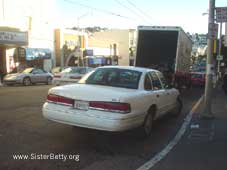
Demands for the death penalty are not
based on rational thinking. It costs more to execute someone
that is does to keep them in prison for life. It does not deter crime,
in fact the states that execute the most people often have the highest
crime rates. It does not end the grief of those who are victims of
the convicted, it does not bring back those who are already gone.
The death penalty serves but a single purpose: to satisfy the emotional
demand for vengeance. Vengeance is a powerful emotion and not one
given to dialogue or reason.
In the face of such emotion sometimes all we can
do is stand silently. Stand and refuse to be moved. Governments
have been brought down by people who stood and refused to move. Sometimes
it takes decades of standing. Unable to do anything else, I must
stand, perhaps for a very a long time, perhaps until the end of my life.
30 January
2002 (Link
to this entry) (Comment)
“Noise inhibits inner peace by distracting us
from spiritual self-examination. Silence is the spiritual knife which lays
open our souls. If we are never silent, we never have to examine
the truth about ourselves. This is why monks and Quakers are so quiet:
so they can discover that which can be found only in silence. But
spiritual self-examination is painful, which is why there aren’t a lot
of monks and Quakers.” - Phillip Gulley, For Everything a Season.

Monday night was very cold, particularly cold
by San Francisco standards. In a rare occurrence, snow fell on the
coastal mountains, ice formed on the highways and cars. San Quentin,
and California’s death row, is located next to the bay. The wind
off the bay was even colder.
Sitting on the frozen road directly in front of
the gates of San Quentin was a group of Buddhists meditating. Just
beyond the Buddhists sat the Quakers, also silently meditating. Next
to the Buddhists were the Franciscan monks. Next to the Franciscan
monks were the nuns and priests of several other orders. Behind the
meditation circles, monks and nuns were groups of people holding candles
in silence or singing songs.
Next to the gate, facing the Buddhists, two snipers
sat on rooftops with machine guns fitted with high power scopes studying
the protestors. On the other side of the gate, another sniper waited
should the first two fall in the wake of raging Buddhists. Long lines
of police with batons and motorcycles closed in behind the protestors,
just in case the crowd of priests, nuns, meditators and singers decided
to rush the gates of the maximum security prison. A group of
kittens guarded by tanks.
At midnight, a Native American drummer began to
play. His drum sounded like a slow heart beat. He stopped drumming
at quarter after the hour. At half past the hour, the prison announced
the death was complete. The crowd outside the gates sang together
and then returned to our cars.
Stephen Anderson killed two people. It is
a terrible thing to consider, a terrible debt that is impossible to repay.
The families of his victims forgave him and asked the state of California
to spare his life; the state refused.
Meditating on the cold ground in front of the
prison, I had a vision of a rope suspended in space. The rope disappeared
into the past on one end and the future on the other. Both the past
and the future were dark and I could only see the piece of rope directly
before me. Suddenly, both the past and future turned to light and
then began to merge together. They moved closer and closer until
the rope between them disappeared and they existed simultaneously.
There in that moment of light, absent of time, I saw the spirit of Stephen
Anderson merge into the whole, merge back into the light. Merge back
as his victims did and as I will someday and you will, too.
31 January
2002 (Link
to this entry) (Comment)
 I’ve
not been good about writing this week. I also skipped several days
at the gym, slept in longer than was probably useful, didn’t shave for
three days, accidentally threw my recycling into the regular garbage and
made no attempt to dig it out, delayed answering an important piece of
correspondence and ate at McDonald’s not once but twice. I’ve
not been good about writing this week. I also skipped several days
at the gym, slept in longer than was probably useful, didn’t shave for
three days, accidentally threw my recycling into the regular garbage and
made no attempt to dig it out, delayed answering an important piece of
correspondence and ate at McDonald’s not once but twice.
On an unrelated subject, John Ashcroft, the Attorney
General, doesn’t like being
photographed in front of the statues in the lobby of the Justice Department
because one of them has an exposed breast. So, he spent $8,000 to
buy curtains to cover the statue that has been in the lobby since the early
1930s. Perhaps a burka would have been cheaper.
And, a friend gave me a very beautiful compliment
today. It was nice to hear.
More...
|



